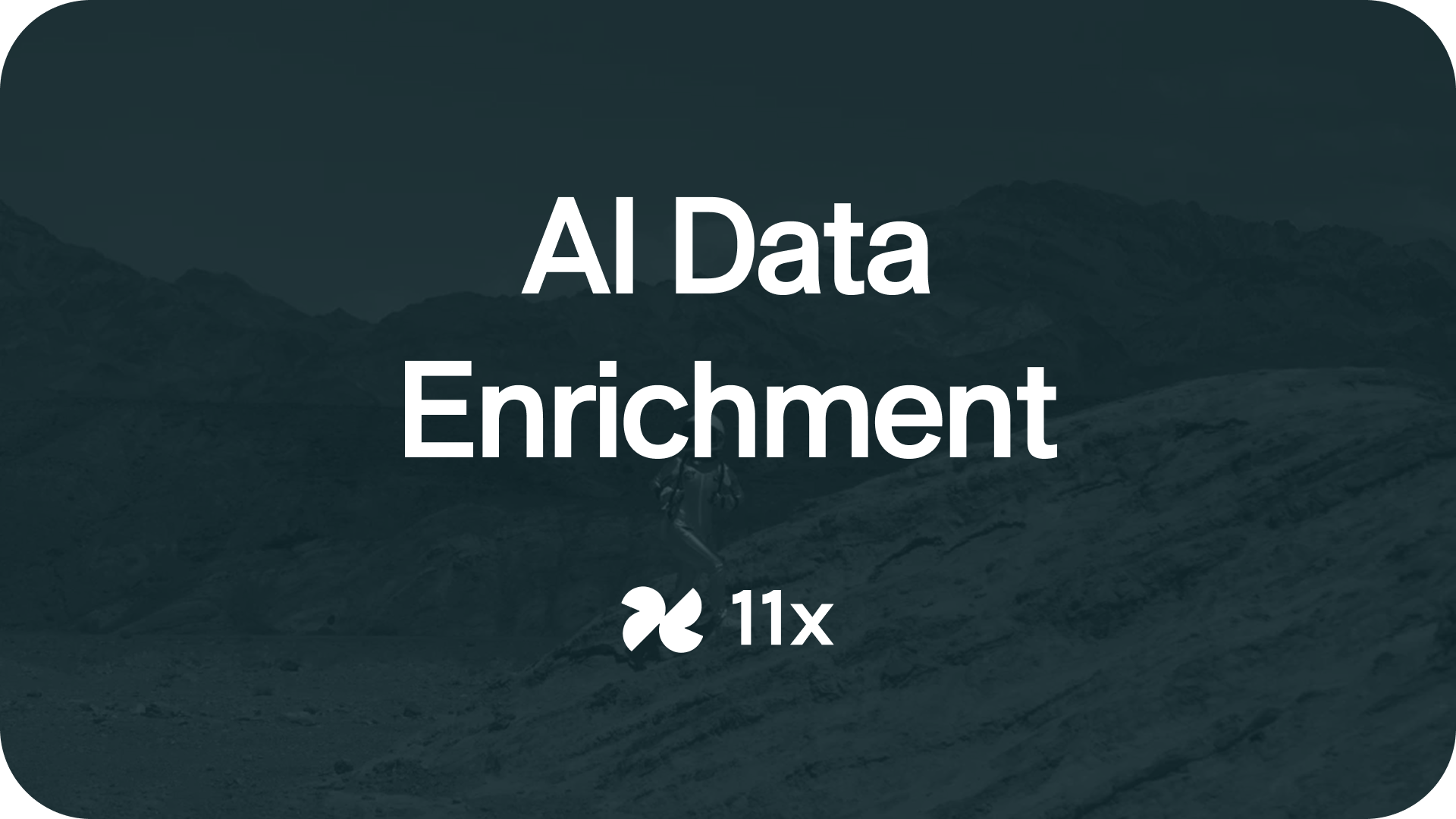Sales Intelligence Solutions 2025 Guide to AI‑Powered Revenue Generation
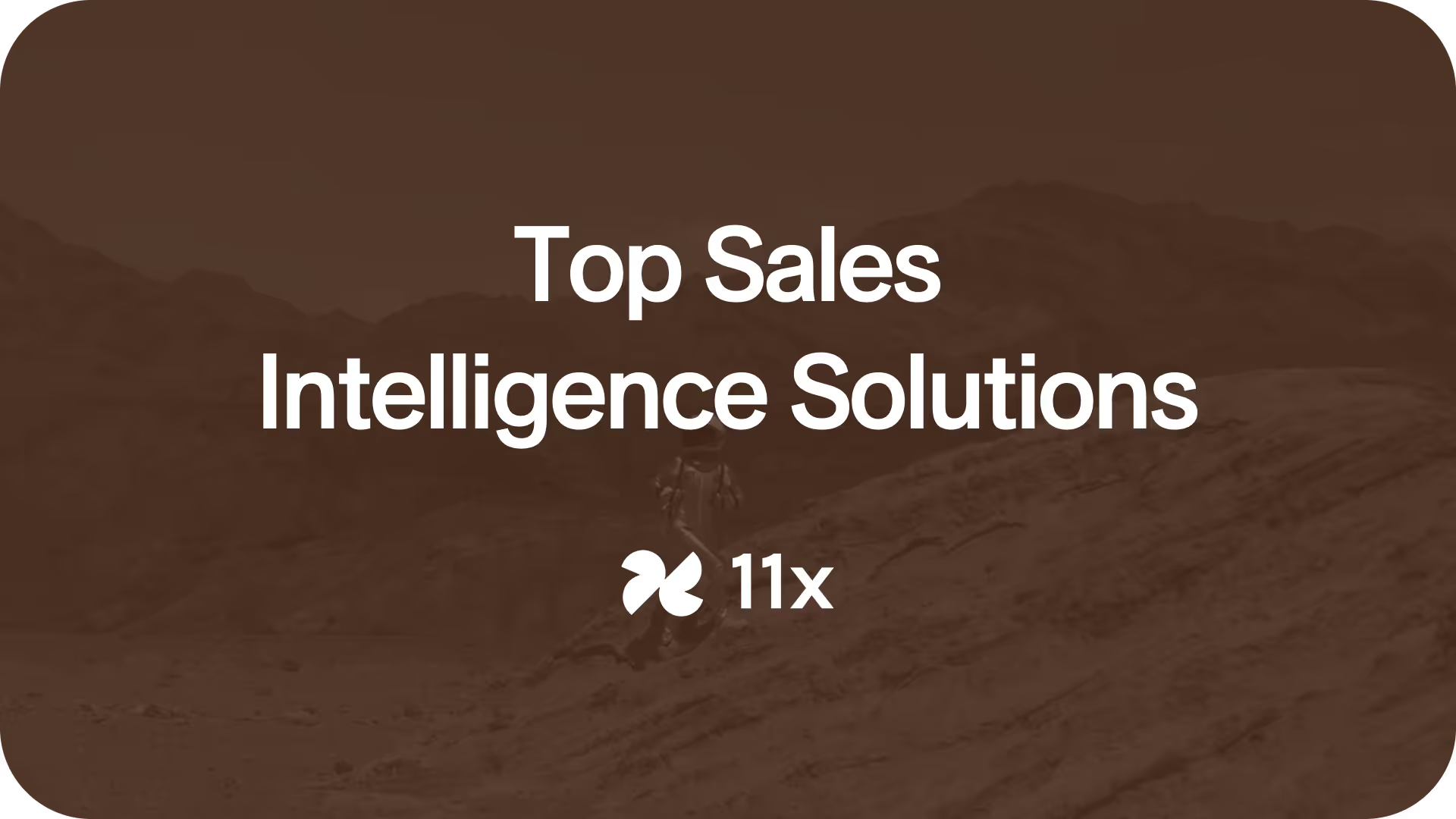
Manual data analysis bottlenecks deals. Static dashboards bury insights beneath endless metrics. While sales teams drown in spreadsheets and fragmented tools, AI-powered sales intelligence solutions are rewriting the rules. They transform passive data collection into autonomous revenue engines that execute at scale.
See how top GTM teams are already doing it in our study on AI sales automation tools.
Modern sales intelligence platforms process buyer intent and act on it immediately. These systems research prospects, identify buying signals, craft personalized outreach, and convert leads into qualified meetings automatically. The result is continuous pipeline generation that scales without adding headcount.
11x leads this transformation with digital workers that combine intelligence and execution. Alice processes real-time buying signals across 21 data partners, while Julian handles inbound qualification and follow-up calls. Both integrate with your existing CRM and tech stack, delivering a qualified pipeline through autonomous execution.
Here's how the top sales intelligence solutions stack up for 2025.
What Defines Modern Sales Intelligence
Here’s a tight, integrated revision that merges your “Evolution of Sales Intelligence Platforms” section into the “What Defines Modern Sales Intelligence” section for smoother pacing and clarity. It keeps the strongest narrative points (the transition from static tools to autonomous systems) while trimming repetition and improving flow.
What Defines a Modern Sales Intelligence Platform?
Sales intelligence has matured from static databases into AI‑driven execution systems. Traditional platforms like ZoomInfo excel at firmographic data and enrichment but still rely on manual interpretation and action. The new generation of AI‑powered solutions processes that same intelligence and executes outreach immediately, converting analysis into outcomes through autonomous workflows.
This shift eliminates the core bottleneck of conventional software—data without execution. Instead of decoding dashboards, teams engage buyers directly while digital workers handle research, outreach, and qualification.
Today’s leading sales intelligence platforms unify four core capabilities that make this possible: data enrichment, buyer intent analysis, CRM automation, and autonomous execution. The best solutions integrate these seamlessly, eliminating fragmented tool stacks and ensuring every signal turns into action.
- Data Quality and Coverage: Comprehensive firmographic, demographic, and technographic data across millions of companies and contacts. Real‑time enrichment ensures accuracy, while advanced search filtering enables precise targeting.
- Intent Signal Processing: AI‑powered analysis of buying signals across social media, web activity, job changes, and funding events. Machine learning identifies high‑intent prospects and optimal engagement timing.
- CRM Integration: Native connectivity with Salesforce, HubSpot, and other platforms. Bi‑directional sync maintains accuracy, while automated workflows streamline lead management and follow‑up.
- Autonomous Execution: The defining trait of next‑generation platforms. These systems identify opportunities and engage decision‑makers through personalized cold email sequences, LinkedIn outreach, and phone‑based qualification, closing the loop between intelligence and action.
Types of Sales Intelligence Tools
Sales intelligence solutions fall into three categories, each serving different stages of the sales process:
- Data Providers focus on contact enrichment and firmographic intelligence. ZoomInfo, Clearbit, and Lusha excel at building comprehensive prospect databases with verified contact information and company details.
- CRM-Native Intelligence modules enhance existing platforms with built-in analytics. HubSpot AI and Salesforce Einstein provide lead scoring, forecasting, and workflow automation within familiar interfaces.
- AI-Driven Execution Platforms combine intelligence with autonomous action. 11x, 6sense, and Clay transform buyer intent data into personalized outreach campaigns that run continuously without manual intervention.
Company size influences platform selection. SMBs often prefer affordable, easy-to-deploy solutions like Apollo or Lusha. Enterprise teams typically choose comprehensive platforms like 11x or 6sense that handle complex sales processes and integrate with existing tech stacks.
Sales Intelligence Tools Comparison
Here’s the reworked section reframed as evaluation criteria, positioned before the summary table and tool analyses. It sets up how readers should evaluate the tools and ties directly into the upcoming comparison and individual breakdowns.
How to Evaluate Sales Intelligence Solutions
Before comparing the top platforms, it helps to understand what defines a high‑performing sales intelligence solution. Modern systems combine depth of data, AI precision, and automation reach to convert information into a qualified pipeline. These five pillars form the evaluation criteria used in the summaries and tool descriptions that follow.
- Advanced Segmentation: The foundation of every intelligence platform is data coverage and precision. Effective tools offer firmographic filters such as company size, industry, and revenue, along with demographic targeting by job title, seniority, and function. Technographic insights show which technologies a company uses and when new implementations occur, helping you assess product fit and timing accurately.
- Buyer Intent Tracking: Top platforms monitor real‑time signals, including website visits, content downloads, social engagement, and funding events. This intent data reveals which prospects are actively evaluating solutions so your outreach lands at the right moment.
- Lead Scoring and Prioritization: Machine learning models calculate conversion probability and automatically reprioritize leads based on engagement behavior. This ensures reps invest time only where buying intent is proven and conversion potential is highest.
- Dashboard Analytics and Reporting: Sophisticated dashboards display campaign performance, conversion rates, and pipeline health. The strongest tools connect engagement data directly to revenue outcomes, allowing RevOps and sales leaders to measure ROI and optimize playbooks continuously.
- Multi‑Channel Integration: Effective systems connect with CRMs, marketing automation suites, and communication tools across email, phone, and social channels. Unified workflows eliminate manual entry and sustain consistent messaging across every buyer touchpoint.
These criteria guide the comparison that follows; each tool has been assessed for its strengths across data quality, automation capability, CRM integration, and execution depth.
Comparison of Leading Sales Intelligence Tools
The individual tool analyses that follow apply these same evaluation pillars, data depth, intent tracking, automation intelligence, analytics clarity, and integration quality, to help teams choose the platform that best aligns with their sales workflow and revenue strategy.
Individual Tool Analysis
1. 11x
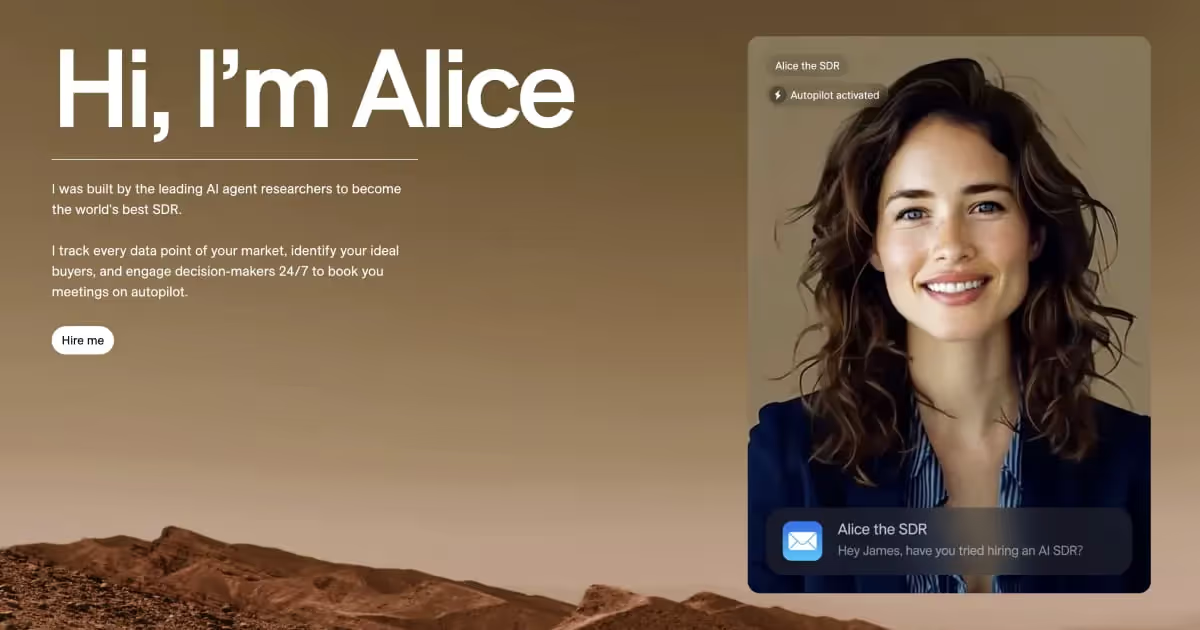
11x represents the evolution from passive intelligence to active execution. Unlike traditional sales intelligence software that requires manual interpretation and action, 11x's digital workers automatically identify buying signals, research prospects, and execute personalized outreach campaigns across multiple channels.
Alice, the AI SDR, processes data from 21 data partners and live web search to identify high-intent prospects. She crafts personalized cold email sequences, manages LinkedIn outreach, and books qualified meetings autonomously. Julian handles inbound qualification, responding to leads within seconds and routing qualified prospects to appropriate team members.
The platform's deep research capabilities parse PDFs, analyze news articles, and extract insights from external sources to create highly personalized messaging. Real-time buyer intent analysis triggers immediate engagement when prospects show interest, optimizing conversion potential.
- Strengths: Complete autonomous execution, real-time learning optimization, native CRM integration, and measurable ROI through performance-based pricing.
- Considerations: Requires alignment during onboarding to match existing sales processes and messaging frameworks.
- Best for: Mid-market to enterprise B2B teams seeking to replace fragmented tool stacks with autonomous sales intelligence that executes end-to-end.
- Pricing: Custom pricing based on business size and automation scope; enterprise and growth plans available on request.
2. ZoomInfo
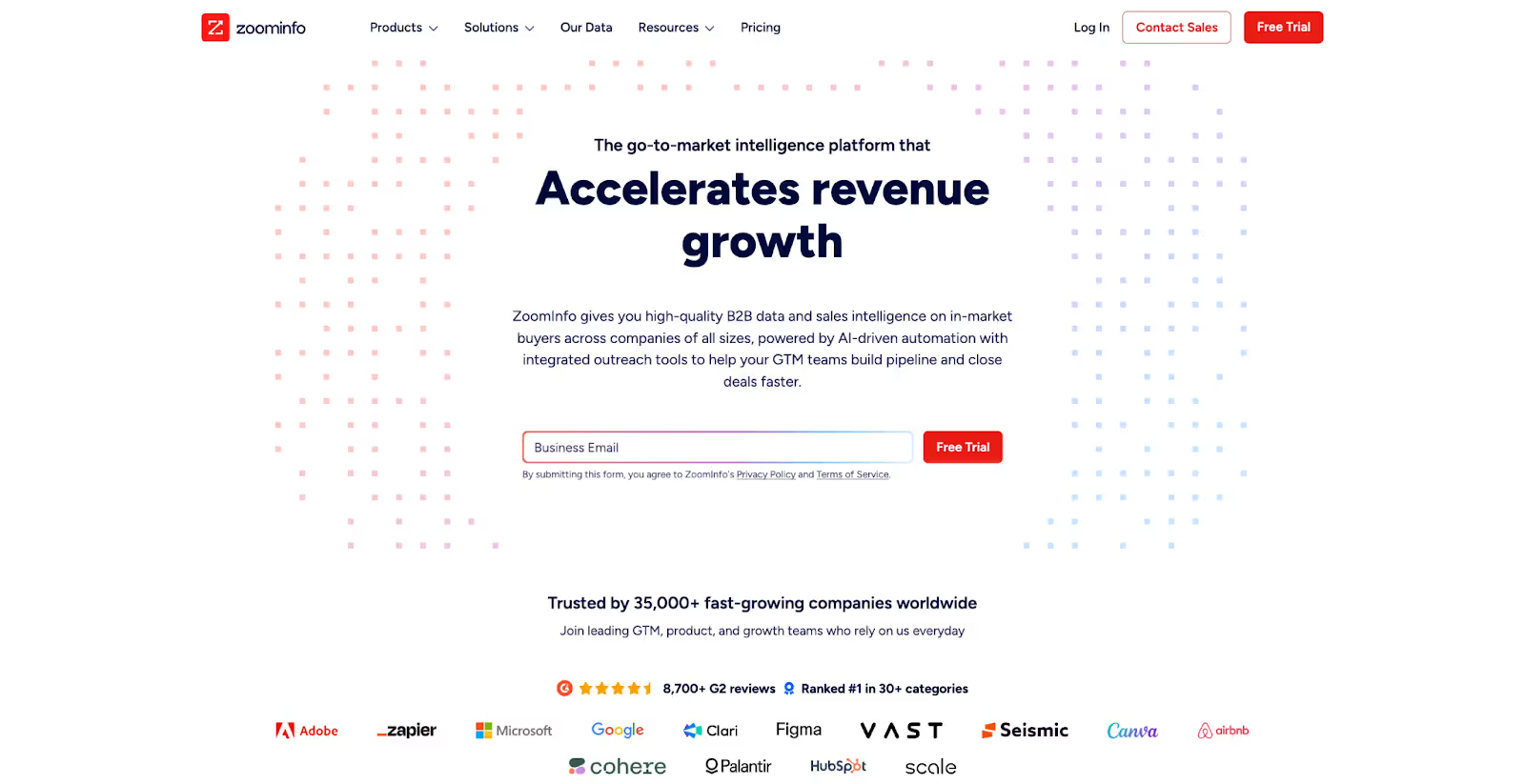
ZoomInfo provides the industry's largest verified contact database with detailed firmographic and technographic data on millions of companies. The platform excels at contact enrichment and advanced search capabilities that enable precise targeting based on company size, industry, technology stack, and growth indicators.
The solution integrates with major CRM platforms to automatically enrich existing records and maintain data accuracy. Advanced intent data identifies companies actively researching solutions, while comprehensive org charts reveal decision-maker relationships and reporting structures.
- Strengths: Massive verified database, detailed company intelligence, strong CRM integration, and comprehensive search filters.
- Considerations: High subscription costs and manual execution requirements for outreach activities.
- Best for: Sales professionals building large B2B databases to fuel outbound campaigns. Compared to autonomous systems like 11x, ZoomInfo excels in data volume but depends on the user to interpret intelligence and trigger outreach. It’s ideal when sheer scale and firmographic precision matter more than automation depth.
- Pricing: Custom enterprise quotes; licenses typically start around several thousand dollars per seat annually.
3. Apollo

Apollo combines sales intelligence data with outreach automation and engagement sequences in a unified environment. The platform provides access to over 275 million verified contacts while enabling automated cold email campaigns, LinkedIn outreach, and phone-based prospecting.
AI-powered features include automatic email personalization, optimal send-time prediction, and response rate optimization based on historical performance data. The Chrome extension enables quick prospect capture during web research, automatically syncing contact information to sequences and CRM systems.
- Strengths: Integrated data and outreach capabilities, affordable pricing tiers, user-friendly interface, and comprehensive automation features.
- Considerations: Limited predictive analytics compared to specialized forecasting platforms.
- Best for: SDR teams executing automated cold email campaigns with integrated contact discovery and CRM synchronization.
- Pricing: Free plan available with limited credits; paid tiers start at $49 per user per month with enterprise upgrades.
4. Cognism
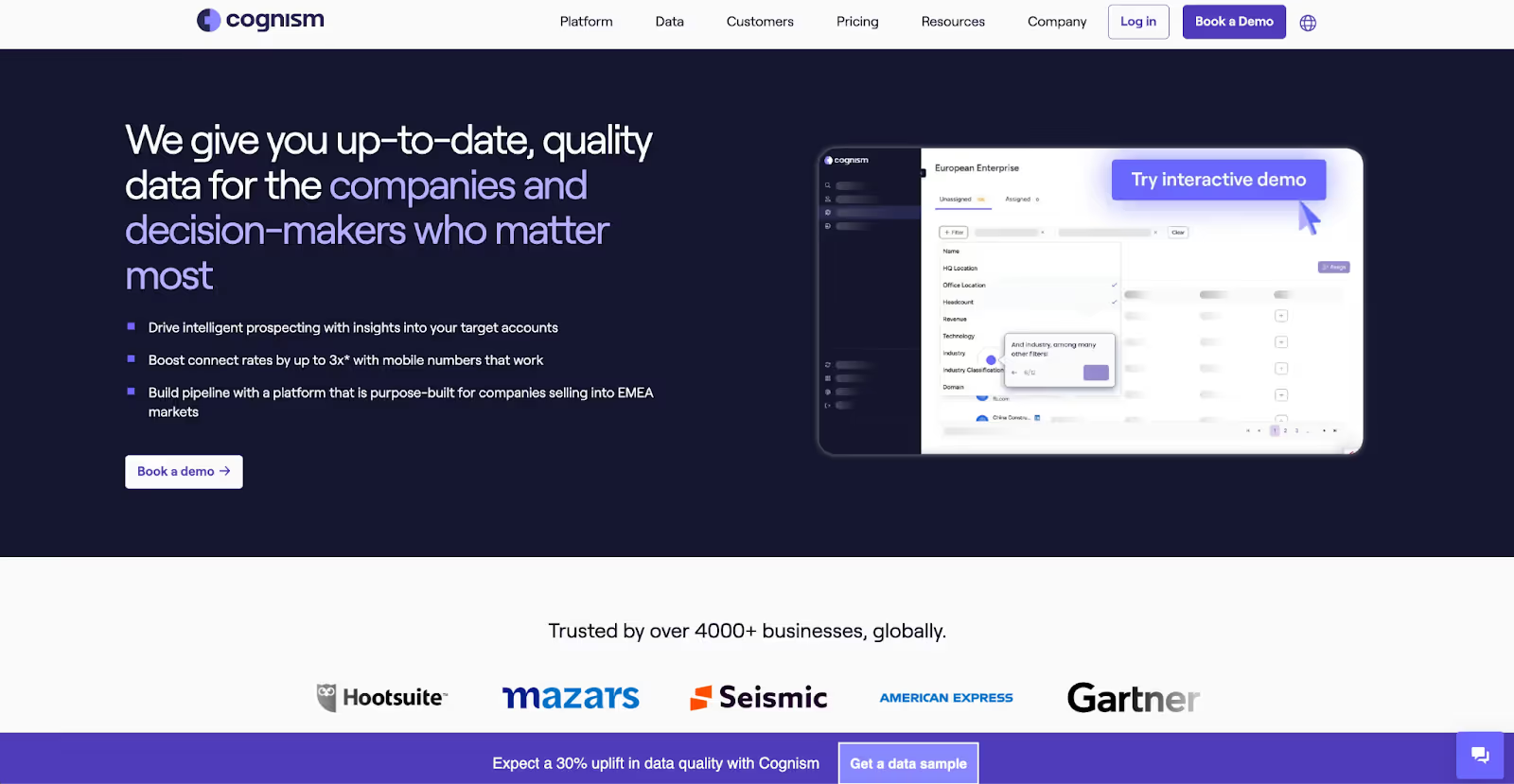
Cognism specializes in verified B2B contact data with particular strength in European and international markets. The platform emphasizes compliance with GDPR and other privacy regulations while maintaining high data accuracy through manual verification processes.
The solution provides comprehensive firmographic data, contact enrichment, and intent signals across global markets. Integration with popular CRM and sales engagement platforms enables automated workflows while maintaining regulatory compliance.
- Strengths: GDPR compliance, strong EMEA coverage, verified contact accuracy, and comprehensive integration options.
- Considerations: Limited pricing transparency and thinner coverage in some geographic markets.
- Best for: Global organizations requiring compliant, verified contact data across international markets and regulated industries.
- Pricing: Quote‑based annual contracts; enterprise users generally range from $10K–$25K per year, depending on volume.
5. LinkedIn Sales Navigator
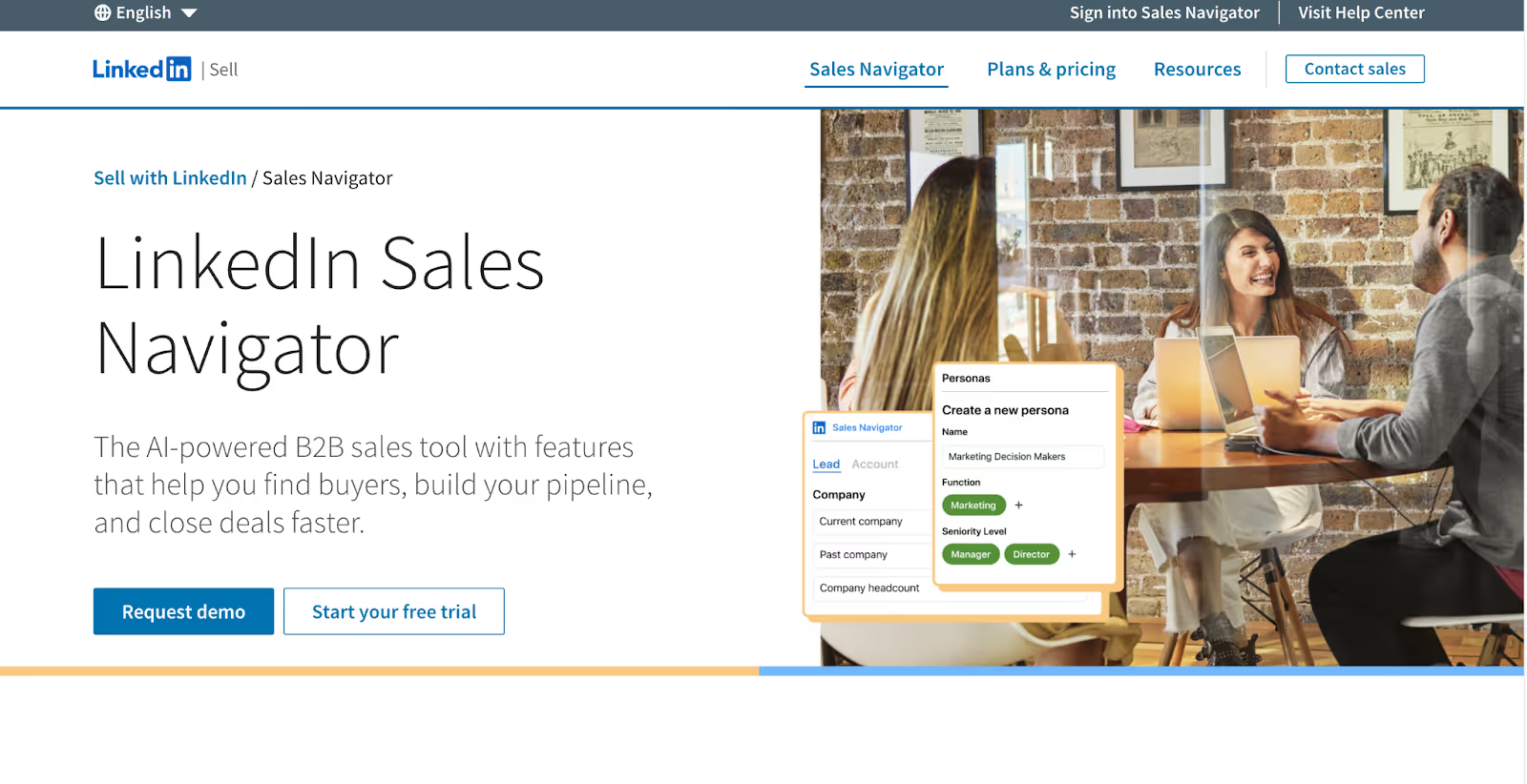
LinkedIn Sales Navigator leverages the professional network's comprehensive database to enable social selling and relationship-based prospecting. The platform provides advanced search capabilities, lead recommendations, and relationship mapping through mutual connections.
Key features include InMail messaging, lead tracking, and team collaboration tools. Real-time alerts notify users when prospects change jobs, share content, or engage with company updates, enabling timely and relevant outreach.
- Strengths: Access to LinkedIn's professional network, relationship intelligence, high-quality job title data, and social selling capabilities.
- Considerations: Limited automation features and heavy reliance on manual outreach activities.
- Best for: Sales leaders prioritizing relationship-based selling and account-based strategies through social networking.
- Pricing: Business plan $99.99 per user per month (billed annually), Advanced and Advanced Plus tiers range from $149 to $160 per user per month with additional CRM sync and TeamLink features.
6. Breeze Intelligence

Breeze Intelligence, formerly known as Clearbit, specializes in real-time data enrichment for existing CRM and marketing automation systems. The platform automatically appends firmographic data, company details, and technographic information to existing contact records through API integrations.
The solution excels at lead routing, territory assignment, and automated segmentation based on enriched data points. Clearbit's reveal capabilities identify anonymous website visitors, enabling targeted follow-up campaigns for high-intent prospects.
- Strengths: Real-time API enrichment, comprehensive firmographic data, native CRM integration, and automated lead routing capabilities.
- Considerations: Focuses primarily on enrichment rather than direct contact discovery or intent data analysis.
- Best for: Marketing teams and RevOps professionals optimizing CRM data quality and automated lead management workflows.
- Pricing: Free tier with 500 requests; paid API usage begins from $99 per month.
7. Lusha

Lusha provides quick contact discovery through browser extension and web application interfaces. The platform focuses on finding verified email addresses and phone numbers for prospects across LinkedIn, company websites, and other professional platforms.
The solution emphasizes ease of use with one-click contact export to popular CRM systems and sales engagement platforms. Credit-based pricing allows flexible usage patterns for teams with variable prospecting volumes.
- Strengths: Simple contact discovery, quick CRM integration, flexible credit-based pricing, and browser-based convenience.
- Considerations: Limited firmographic data depth and potential data accuracy inconsistencies.
- Best for: Individual reps or lean teams needing fast contact discovery without the overhead of enterprise tools. Lusha’s simplicity and affordability make it attractive for scrappy outbound programs, but its limited data depth and manual workflows can hold back larger teams. 11x offers a faster alternative by transforming verified data into autonomous outreach instead of leaving it idle in a CRM.
- Pricing: Free plan available with limited credits; paid tiers start at $49 per user per month, rising to around $89 per user for Pro plans that add higher credit limits and API access.
8. 6sense
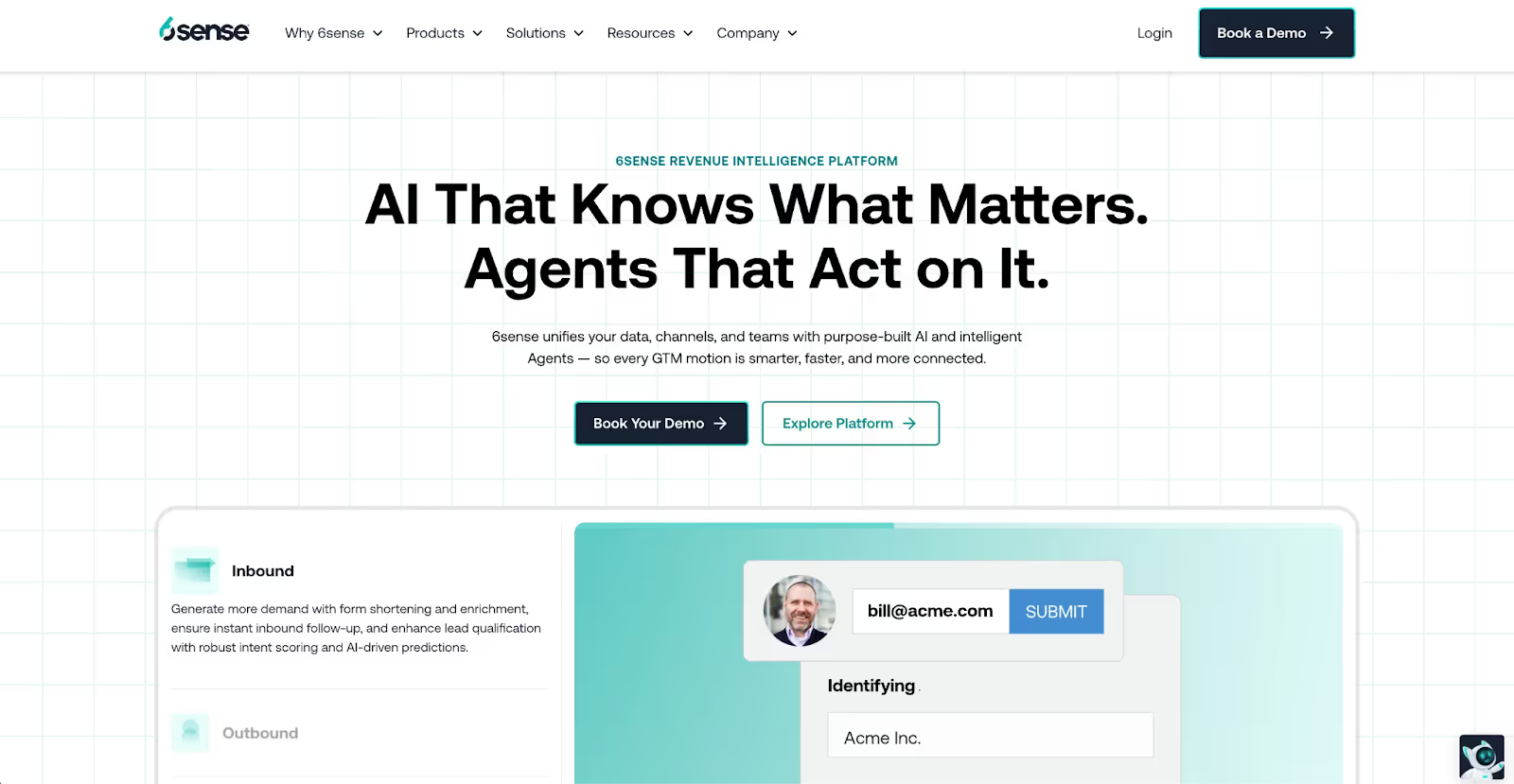
6sense provides comprehensive buyer intent analysis and predictive analytics for enterprise sales organizations. The platform identifies accounts showing buying signals across multiple channels, predicting purchase timing and budget allocation with machine learning algorithms.
Advanced features include account-based advertising, personalized website experiences, and sales orchestration based on buyer journey stage. The platform integrates with major CRM and marketing automation systems to enable coordinated revenue strategies.
- Strengths: Comprehensive buyer intent analytics, predictive forecasting models, account-based orchestration, and enterprise-scale capabilities.
- Considerations: Complex implementation requirements and premium pricing for advanced features.
- Best for: Enterprise marketing and RevOps teams aligning sales and marketing efforts through predictive buyer intelligence.
- Pricing: Custom enterprise pricing based on seat volume and data scope. Typical customer contracts start around $25,000 per year and can exceed $100,000 for global deployments with advanced intent analytics and account-based orchestration.
9. Clay
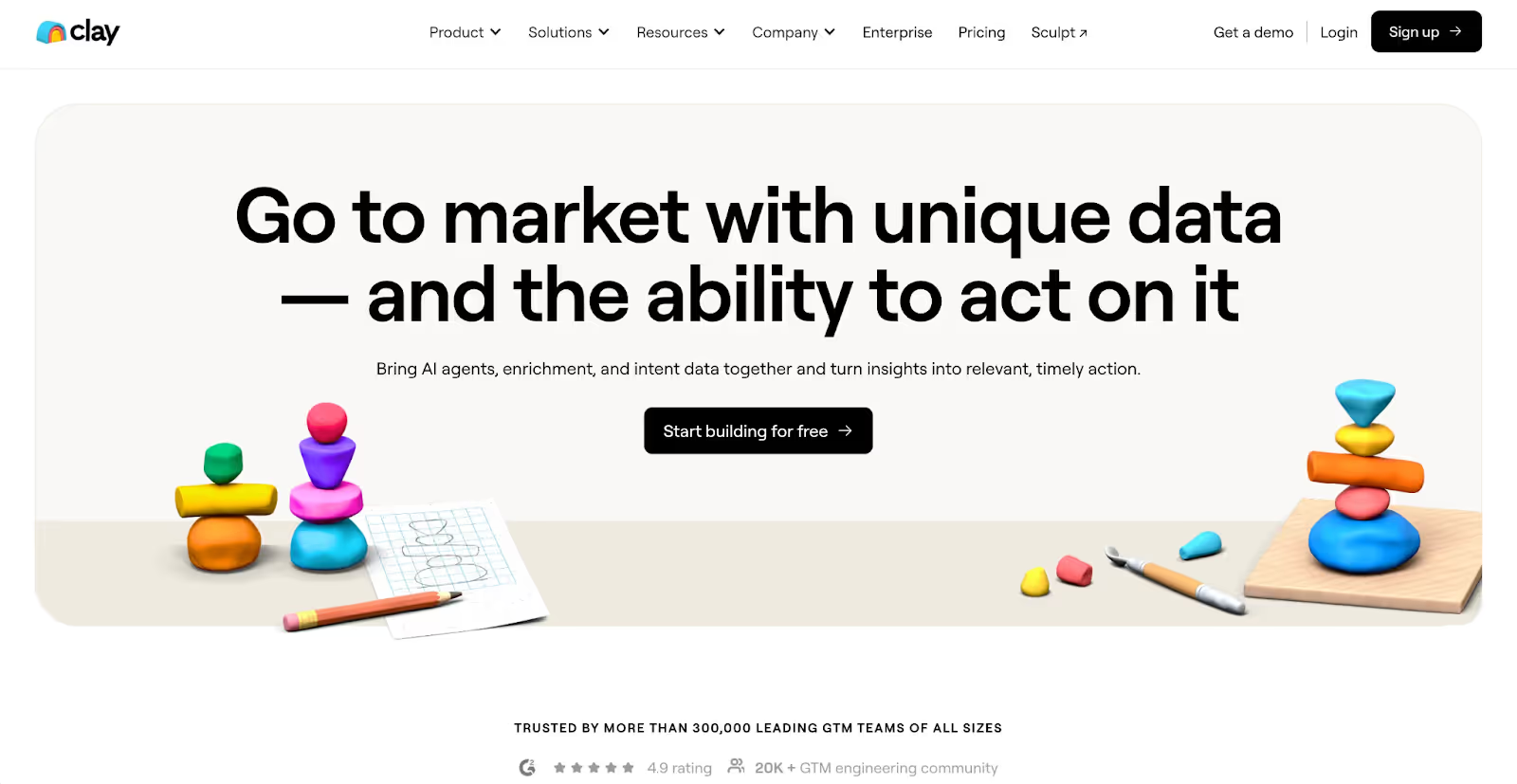
Clay combines data enrichment with flexible workflow automation through a visual, no-code interface. The platform connects multiple data sources and enrichment providers to create custom research and outreach sequences tailored to specific use cases.
Users can build complex data flows that combine web scraping, API calls, and manual research to create comprehensive prospect profiles. Integration with popular sales tools enables automated handoffs between research and execution phases.
- Strengths: Visual workflow builder, flexible data source integration, customizable automation sequences, and comprehensive enrichment options.
- Considerations: Learning curve for complex workflow creation and dependency on multiple third-party data providers.
- Best for: Operations and growth teams building complex enrichment and research workflows through a visual, no‑code interface. Clay shines for flexibility and creative pipeline experimentation but requires manual setup and monitoring. Compared with 11x’s digital workers that execute those flows autonomously, Clay is ideal for teams who prefer building and tweaking their own automations rather than handing them off to AI agents.
- Pricing: Free starter plan with limited rows and credits. Paid tiers begin at $149 per user per month (Pro) and extend to $350 per user for Teams with expanded automation, API connectors, and shared workspace controls.
10. LeadIQ

LeadIQ simplifies prospect capture from LinkedIn and other sources with automatic CRM synchronization and sales engagement platform integration. The platform focuses on reducing manual data entry while maintaining contact accuracy through verification processes.
Key features include bulk contact capture, automated sequence enrollment, and team collaboration tools for prospect sharing and assignment. Integration with popular sales tools enables smooth handoffs from research to outreach phases.
- Strengths: Streamlined contact capture, reliable CRM integration, team collaboration features, and automated sequence enrollment.
- Considerations: Limited data source variety and basic analytics compared to comprehensive intelligence platforms.
- Best for: SDR teams optimizing lead capture efficiency and reducing manual data entry in existing sales processes.
- Pricing: Free plan with limited sync; paid tiers from $15 per user per month.
AI-Powered Outreach and Real-Time Execution
The most advanced sales intelligence platforms combine data analysis with autonomous execution capabilities. Rather than simply identifying opportunities, these systems engage prospects through personalized, multi-channel campaigns that adapt based on response patterns and buying signals.
AI-powered outreach systems process intent data, craft personalized messaging, and optimize engagement timing automatically. Machine learning algorithms analyze successful interaction patterns to improve future campaign performance, creating continuous optimization loops that enhance results over time.
11x exemplifies this approach through Alice's autonomous execution. When buying signals indicate prospect interest, Alice immediately crafts personalized outreach sequences across email, LinkedIn, and phone channels. Real-time optimization adjusts messaging, timing, and follow-up cadence based on engagement patterns, maximizing conversion rates without manual intervention.
This evolution from reactive to proactive intelligence represents the future of B2B sales. Teams that adopt autonomous execution gain significant advantages in response speed, personalization depth, and consistent follow-up that human-powered processes cannot match.
Transforming Data into Revenue Intelligence
Effective sales intelligence platforms transform raw data into actionable insights that directly impact revenue outcomes. The best solutions move beyond static dashboards to provide dynamic recommendations that guide strategic decision-making and tactical execution.
Modern platforms use predictive analytics to forecast deal probability, identify expansion opportunities, and predict churn risks based on engagement patterns. Machine learning algorithms analyze successful sales cycles to recommend optimal next steps, resource allocation, and competitive strategies.
Lead scoring evolves from simple demographic matching to complex behavioral analysis, incorporating website activity, content engagement, social media interactions, and competitive intelligence. Dynamic scoring adjusts in real-time as prospects move through the buyer journey, ensuring sales teams focus efforts on the highest-probability opportunities.
The integration of intent data with execution capabilities creates closed-loop optimization systems. As digital workers execute campaigns, performance metrics feed back into targeting algorithms, improving future prospect identification and engagement strategies automatically.
AI Sales Intelligence vs Traditional CRM Workflows
Traditional CRM workflows depend on manual data entry, reactive follow-up processes, and static reporting that quickly becomes outdated. Sales reps spend significant time updating records, scheduling follow-ups, and interpreting dashboard metrics rather than engaging prospects and closing deals.
AI-powered sales intelligence platforms automate these administrative tasks while providing proactive recommendations for optimal engagement strategies. Autonomous digital workers handle data collection, record updates, and systematic follow-up processes, freeing human reps to focus on high-value relationship building and deal negotiation.
The shift from manual to autonomous processes creates measurable improvements in sales performance metrics. Teams using AI-driven platforms often see higher activity volumes, improved response rates, shorter sales cycles, and more predictable pipeline generation compared to traditional CRM-dependent workflows.
11x demonstrates this transformation by combining intelligence gathering with autonomous execution. While traditional systems require reps to interpret buyer intent data and manually create outreach sequences, Alice processes signals automatically and executes personalized campaigns continuously, delivering qualified meetings around the clock without human assistance. This end‑to‑end automation closes the gap between insight and action, allowing sales organizations to operate at full velocity while maintaining precision and personalization.
Compliance and Trust in Sales Intelligence
Handling vast amounts of buyer intent data demands rigorous compliance and privacy standards. Modern sales intelligence solutions earn adoption by proving their ability to protect sensitive information across every workflow.
11x is certified under SOC 2 Type II and CASA Tier 3, validating system security, availability, and confidentiality protocols. All data flows run through Google Cloud’s high‑security facilities with full encryption, redundancy, and real‑time monitoring. GDPR and CCPA compliance ensure lawful data use across all markets, including consented outreach and data storage.
This framework allows sales teams to execute large‑scale automation confidently, knowing every action, from enrichment to follow‑up, is protected by enterprise‑grade security.
Choosing the Right Sales Intelligence Solution
Selecting the right sales intelligence software depends on your organization’s scale, workflow complexity, and revenue priorities.
Mid‑sized teams often value quick deployment, pre‑built integrations, and affordable access to enrichment datasets. Platforms such as Apollo or Clearbit can accelerate top‑of‑funnel growth efficiently.
Enterprise organizations, by contrast, measure ROI through end‑to‑end automation and measurable impact on pipeline creation. They need platforms like 11x that unify data ingestion, buyer intelligence, and autonomous execution under one umbrella, removing the friction between research, outreach, and CRM updates.
When comparing tools, prioritize:
- CRM compatibility: Ensure seamless synchronization with Salesforce, HubSpot, or your core system of record.
- Automation depth: Prefer platforms that act on data, not just report on it.
- AI sophistication: Look for continuous learning that improves engagement timing, messaging accuracy, and lead qualification.
- Pricing alignment: Subscription models suit steady data enrichment. Performance‑based pricing, as offered by 11x, ties costs directly to pipeline outcomes.
Your sales intelligence partner should not only surface opportunities but also autonomously convert them.
Why 11x Wins the Category
11x redefines what sales intelligence means. Instead of selling access to static databases, it delivers AI digital workers that transform data into action.
Alice identifies high‑intent leads across 21 premium data partners, performs deep contextual research through live web search, and triggers personalized outreach sequences across channels, all automatically. Julian calls, qualifies, and nurtures prospects in real time, ensuring inbound momentum never stalls.
Together, they execute continuous multi‑channel engagement, syncing every outcome with your CRM for accurate forecasting and attribution. What once required an SDR team, a data provider, and multiple outreach tools now runs autonomously, driven by AI reasoning and measurable performance metrics.
While traditional platforms show you the opportunity, 11x creates it. It turns market intelligence into revenue through autonomous execution, real‑time learning, and native CRM integration that keeps every workflow clean, fast, and accurate.
For a deeper look at how autonomous GTM execution replaces manual prospecting and outreach, see AI Sales Automation Tools redefining modern teams.
To explore more frameworks for building AI‑driven revenue engines, visit the full 11x Tips library.


.png)
.png)
.png)
.png)
.png)
